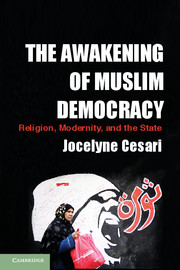Book contents
- Frontmatter
- Contents
- Acknowledgments
- Preface
- Part I THE MAKING OF ISLAM AS A MODERN RELIGION
- Part II ISLAMISM AS THE PREEMINENT POLITICAL FORCE PRE– AND POST–ARAB SPRING
- Part III THE DISJUNCTION OF DEMOCRACY AND SECULARISM – LESSONS LEARNED FROM THE ARAB SPRING
- 10 The Rise of Unsecular Democracies: The Conundrum of Religious Freedom in Muslim Democracies
- 11 The Way Forward: The Role of Islam in Democratization
- General Conclusion The Tragedy of Modernity
- Appendix I Religious Violence Index
- Appendix II Egyptian Constitution, Ratified on December 26, 2012. Suspended on July 3, 2013
- Bibliography
- Index
11 - The Way Forward: The Role of Islam in Democratization
Published online by Cambridge University Press: 05 July 2014
- Frontmatter
- Contents
- Acknowledgments
- Preface
- Part I THE MAKING OF ISLAM AS A MODERN RELIGION
- Part II ISLAMISM AS THE PREEMINENT POLITICAL FORCE PRE– AND POST–ARAB SPRING
- Part III THE DISJUNCTION OF DEMOCRACY AND SECULARISM – LESSONS LEARNED FROM THE ARAB SPRING
- 10 The Rise of Unsecular Democracies: The Conundrum of Religious Freedom in Muslim Democracies
- 11 The Way Forward: The Role of Islam in Democratization
- General Conclusion The Tragedy of Modernity
- Appendix I Religious Violence Index
- Appendix II Egyptian Constitution, Ratified on December 26, 2012. Suspended on July 3, 2013
- Bibliography
- Index
Summary
As noted earlier, according to mainstream political analysis, if elections, rule of law, and the disappearance of tutelary authorities were to occur, this would create the institutional guarantees that must be in place for the functioning of a democracy. Even though secularism is not part of the minimal democratic “kit,” Alfred Stepan rightly argues that some separation between state and religious institutions is needed in any operational democracy. As I have argued in Part I, this institutional differentiation is a necessary but not sufficient condition of secularity, because it does not address the level of freedom of self (as a specific component of the freedom of the individual). In this regard, the experiences of Indonesia and Senegal, the two Muslim countries with an equidistance of state and religion, can illustrate a possible path toward democratization that would not entail the adoption of the Western paradigm of separation of church and state. It will also allow us to illustrate that even in these secular regimes of Indonesia and Senegal, the rights of the self are not a given.
MULTIPLE IMPLEMENTATIONS OF STATE-RELIGION EQUIDISTANCE
To understand how a shift toward democratization might occur, I consider Alfred Stepan’s “twin tolerations” paradigm, coupled with the “principled distance” model advanced by Rajeev Bhargava. These two approaches help redefine secularization without borrowing from the Western experience. In other words, they allow us to discuss the conditions for secularization without equating it with secularism. “Twin tolerations” refers to a clear demarcation between the respective spheres of influence of religious and state institutions, where neither religious nor political establishments impinge unduly on the other’s jurisdiction and set of rights. This demarcation does not have to translate into a complete separation. The concept of “principled distance” between religion and state introduced by Barghava, unlike neutrality, allows for state intervention in religious affairs to provide assistance to particular groups and to assure that everyone’s rights within a group are upheld.
- Type
- Chapter
- Information
- The Awakening of Muslim DemocracyReligion, Modernity, and the State, pp. 264 - 274Publisher: Cambridge University PressPrint publication year: 2014



